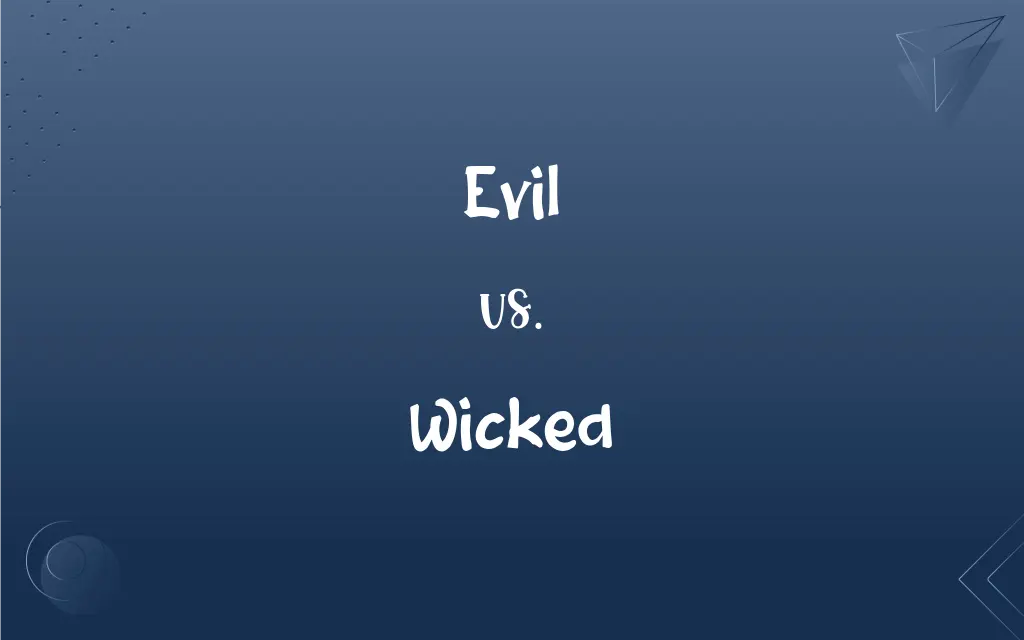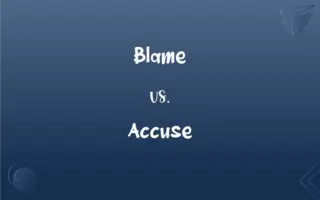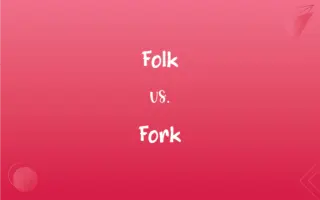Evil vs. Wicked: What's the Difference?
Edited by Harlon Moss || By Janet White || Updated on October 12, 2023
"Evil" refers to profound immorality, while "Wicked" can mean malicious intent or actions, and can also be informal slang for 'impressive' or 'very good'.

Key Differences
"Evil" is a term that often connotes profound immorality or malevolence. When something or someone is described as "evil," it generally implies a deep-rooted maliciousness that goes beyond mere wrongdoing. "Wicked," on the other hand, also suggests malevolence but can be used in a broader context. It can describe actions, intentions, or characters that are morally wrong.
In some contexts, "evil" might be seen as a more intense or severe term than "wicked." For instance, one might describe a dictator who committed genocide as "evil," while a mischievous child might be called "wicked" for playing a prank. However, it's essential to note that both words, Evil and Wicked, can describe extreme wrongdoing.
Language evolves, and the word "wicked" has taken on informal slang meanings in some contexts. While "evil" consistently refers to malevolence or profound immorality, "wicked" can also be used colloquially to mean 'very good' or 'impressive.' For example, one might say, "That was a wicked guitar solo!"
Additionally, both "evil" and "wicked" have historical and cultural nuances. In religious contexts, "evil" often describes forces or actions in direct opposition to divine goodness. "Wicked," meanwhile, has been used in literature and folklore, often to describe villains or malevolent forces.
Comparison Chart
Primary Meaning
Profound immorality or malevolence.
Malicious intent or actions.
ADVERTISEMENT
Intensity
Often seen as more intense/severe.
Can be milder than "evil."
Alternative Meanings
Generally consistent in meaning.
Can also mean 'very good' in slang.
Usage
Common in moral, religious, and philosophical contexts.
Broad usage; includes literature and informal slang.
Origins
Rooted in old English, with connotations in many religions.
Old English origin; evolved in folklore and pop culture.
Evil and Wicked Definitions
Evil
Morally bad or wrong; wicked
An evil tyrant.
ADVERTISEMENT
Wicked
Strikingly good, effective, or skillful.
She played a wicked guitar solo.
Evil
Morally wrong or bad.
His actions were truly evil.
Wicked
Mischievous or playfully malicious.
The child gave a wicked grin after playing a prank.
Evil
In direct opposition to moral law or goodness.
Many religions speak of combating evil.
Wicked
Intended to or capable of harming someone or something.
He had a wicked fastball in baseball.
Evil
Causing ruin, injury, or pain; harmful
The evil effects of a poor diet.
Wicked
Morally wrong or evil.
His wicked ways were known throughout the land.
Evil
Characterized by or indicating future misfortune; ominous
Evil omens.
Wicked
Severe or distressing.
The injury looked wicked and painful.
Evil
Bad or blameworthy by report; infamous
An evil reputation.
Wicked
Evil or immoral
"this wicked man Hitler, the repository and embodiment of many forms of soul-destroying hatred" (Winston S. Churchill).
Evil
Characterized by anger or spite; malicious
An evil temper.
Wicked
Playfully malicious or mischievous
A wicked prank.
A critic's wicked wit.
Evil
The quality of being morally bad or wrong; wickedness.
Wicked
Severe and distressing
A wicked cough.
A wicked gash.
Wicked driving conditions.
Evil
That which causes harm, misfortune, or destruction
A leader's power to do both good and evil.
Wicked
Highly offensive; obnoxious
A wicked stench.
Evil
An evil force, power, or personification.
Wicked
(Slang) Strikingly good, effective, or skillful
A wicked curve ball.
A wicked imitation.
Evil
Something that is a cause or source of suffering, injury, or destruction
The social evils of poverty and injustice.
Wicked
Used as an intensive
"a ... body suit, which she describes as wicked comfortable" (Nathan Cobb).
Evil
In an evil manner.
Wicked
Evil or mischievous by nature.
Genuine cowards follow wicked people and cannot reliably sustain any virtue.
Evil
Intending to harm; malevolent.
An evil plot to brainwash and even kill innocent people
Wicked
(slang) Excellent; awesome; masterful.
That was a wicked guitar solo, bro!
Evil
Morally corrupt.
If something is evil, it is never mandatory.
Do you think that companies that engage in animal testing are evil?
Wicked
Having a wick.
A two-wicked lamp
Evil
Unpleasant, foul (of odour, taste, mood, weather, etc.).
Wicked
Active; brisk.
Evil
Producing or threatening sorrow, distress, injury, or calamity; unpropitious; calamitous.
Wicked
Infested with maggots.
Evil
(obsolete) Having harmful qualities; not good; worthless or deleterious.
An evil beast; an evil plant; an evil crop
Wicked
Alternative form of wick, as applying to inanimate objects only.
Evil
Undesirable; harmful; bad practice.
Global variables are evil; storing processing context in object member variables allows those objects to be reused in a much more flexible way.
Wicked
Very, extremely.
The band we went to see the other night was wicked loud!
Evil
Moral badness; wickedness; malevolence; the forces or behaviors that are the opposite or enemy of good.
The evils of society include murder and theft.
Evil lacks spirituality, hence its need for mind control.
Wicked
Simple past tense and past participle of wick
Evil
Something which impairs the happiness of a being or deprives a being of any good; something which causes suffering of any kind to sentient beings; harm; injury; mischief.
Wicked
Having a wick; - used chiefly in composition; as, a two-wicked lamp.
Evil
(obsolete) A malady or disease; especially in combination, as in king's evil, colt evil.
Wicked
Evil in principle or practice; deviating from morality; contrary to the moral or divine law; addicted to vice or sin; sinful; immoral; profligate; - said of persons and things; as, a wicked king; a wicked woman; a wicked deed; wicked designs.
Hence, then, and evil go with thee along,Thy offspring, to the place of evil, hell,Thou and thy wicked crew!
Never, never, wicked man was wise.
Evil
(obsolete) wickedly, evilly, iniquitously
Wicked
Cursed; baneful; hurtful; bad; pernicious; dangerous.
This were a wicked way, but whoso had a guide.
Evil
(obsolete) injuriously, harmfully; in a damaging way.
Wicked
Ludicrously or sportively mischievous; disposed to mischief; roguish.
Pen looked uncommonly wicked.
Evil
(obsolete) badly, poorly; in an insufficient way.
It went evil with him.
Wicked
Morally bad in principle or practice
Evil
Having qualities tending to injury and mischief; having a nature or properties which tend to badness; mischievous; not good; worthless or deleterious; poor; as, an evil beast; and evil plant; an evil crop.
A good tree can not bring forth evil fruit.
Wicked
Having committed unrighteous acts;
A sinful person
Evil
Having or exhibiting bad moral qualities; morally corrupt; wicked; wrong; vicious; as, evil conduct, thoughts, heart, words, and the like.
Ah, what a sign it is of evil life,When death's approach is seen so terrible.
Wicked
Intensely or extremely bad or unpleasant in degree or quality;
Severe pain
A severe case of flu
A terrible cough
Under wicked fire from the enemy's guns
A wicked cough
Evil
Producing or threatening sorrow, distress, injury, or calamity; unpropitious; calamitous; as, evil tidings; evil arrows; evil days.
Because he hath brought up an evil name upon a virgin of Israel.
The owl shrieked at thy birth - an evil sign.
Evil news rides post, while good news baits.
It almost led him to believe in the evil eye.
Wicked
Morally bad or wrong;
Evil purposes
An evil influence
Evil deeds
Evil
Anything which impairs the happiness of a being or deprives a being of any good; anything which causes suffering of any kind to sentient beings; injury; mischief; harm; - opposed to good.
Evils which our own misdeeds have wrought.
The evil that men do lives after them.
Wicked
Highly offensive; arousing aversion or disgust;
A disgusting smell
Distasteful language
A loathsome disease
The idea of eating meat is repellent to me
Revolting food
A wicked stench
Evil
Moral badness, or the deviation of a moral being from the principles of virtue imposed by conscience, or by the will of the Supreme Being, or by the principles of a lawful human authority; disposition to do wrong; moral offence; wickedness; depravity.
The heart of the sons of men is full of evil.
Evil
Malady or disease; especially in the phrase king's evil, the scrofula.
He [Edward the Confessor] was the first that touched for the evil.
Evil
In an evil manner; not well; ill; badly; unhappily; injuriously; unkindly.
It went evil with his house.
The Egyptians evil entreated us, and affected us.
Evil
Morally objectionable behavior
Evil
That which causes harm or destruction or misfortune;
The evil that men do lives after them; the good is oft interred with their bones
Evil
The quality of being morally wrong in principle or practice;
Attempts to explain the origin of evil in the world
Evil
Morally bad or wrong;
Evil purposes
An evil influence
Evil deeds
Evil
Having the nature of vice
Evil
Tending to cause great harm
Evil
Having or exerting a malignant influence;
Malevolent stars
A malefic force
Evil
Harmful or injurious.
The storm did evil damage to the town.
Evil
Marked by bad luck or misfortune.
An evil omen appeared in the sky.
Evil
Profoundly malevolent.
The villain in the story was pure evil.
FAQs
Does "Evil" have slang meanings like "Wicked"?
No, "evil" consistently refers to malevolence or profound immorality.
Is "Evil" a stronger term than "Wicked"?
Generally, "evil" is perceived as more intense or severe than "wicked."
Can both terms be used interchangeably?
While they have similar meanings, context matters; they aren't always interchangeable.
What does "Evil" primarily convey?
"Evil" primarily conveys profound immorality or malevolence.
Can "Wicked" have a positive connotation?
Yes, "wicked" can be slang for 'very good' or 'impressive' in certain contexts.
Is "Evil" used in popular culture?
Yes, "evil" is often used to describe villains or antagonistic forces in media.
How do literature and folklore use "Wicked"?
"Wicked" is often used to describe villains, like witches or malevolent characters.
How do religious contexts treat the word "Evil"?
In many religions, "evil" describes forces or actions opposing divine goodness.
Do "Evil" and "Wicked" have synonyms?
Yes, terms like "malevolent," "sinister," or "nefarious" can be synonymous, depending on context.
How old are the terms "Evil" and "Wicked"?
Both terms have origins in Old English and have evolved over centuries.
Can "Evil" describe an event or situation?
Yes, it can describe harmful or disastrous events, like an "evil omen."
Which term is more versatile in everyday language?
"Wicked" has broader usage due to its slang and varied meanings.
Are there idioms involving "Evil" or "Wicked"?
Yes, like "lesser of two evils" or "wicked ways."
Are "Evil" and "Wicked" always negative in moral contexts?
Generally, yes, but "wicked" can have neutral or positive meanings outside moral contexts.
Can "Wicked" be used playfully?
Yes, "wicked" can describe playful mischievousness, like a child's prank.
Why might someone use "Wicked" in a positive sense?
Language evolves, and "wicked" has become slang for 'impressive' or 'very good' in some regions.
Are the terms culturally specific?
While they originate from English, their concepts exist in various cultures, albeit with different nuances.
Can objects be described as "Wicked"?
Yes, often to describe effectiveness or potential harm, like a "wicked blade."
Can "Wicked" refer to severity?
Yes, it can describe something severe or distressing, e.g., a "wicked storm."
About Author
Written by
Janet WhiteJanet White has been an esteemed writer and blogger for Difference Wiki. Holding a Master's degree in Science and Medical Journalism from the prestigious Boston University, she has consistently demonstrated her expertise and passion for her field. When she's not immersed in her work, Janet relishes her time exercising, delving into a good book, and cherishing moments with friends and family.
Edited by
Harlon MossHarlon is a seasoned quality moderator and accomplished content writer for Difference Wiki. An alumnus of the prestigious University of California, he earned his degree in Computer Science. Leveraging his academic background, Harlon brings a meticulous and informed perspective to his work, ensuring content accuracy and excellence.































































